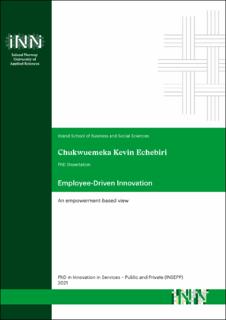| dc.description.abstract | The participation of employees in the innovation process has become a focus of various research streams. Previous studies show that the assumption that innovation requires specific skills is no longer tenable in today’s modern organizations. This dissertation focuses on the involvement of employees without innovation-specific functions in the framework of employee-driven innovation (EDI) using empowerment as my lens. In most organizations, these employees constitute a significant proportion of the workforce, and understanding how to harness their creative potential should be an advantage to the majority of organizations. The overarching aim of this dissertation is to gain more knowledge about EDI and empowerment-related approaches that can stimulate it.
To address these issues, I conducted three empirical studies that resulted in the four appended papers. Paper I focuses on the conceptualization and operationalization of EDI. Paper II examines the link between structural empowerment and EDI and how psychological empowerment mediates this relationship. Paper III concerns how leadership behaviours relate to EDI and the mediating role of leader–member exchange. Paper IV investigates individuallevel antecedents of EDI.
Based on the findings, EDI was operationalized as a second-order reflective construct consisting of three dimensions/stages: emergence and search for ideas, idea generation, and idea development and implementation. It was also found that various empowerment approaches, namely structural empowerment, empowering leadership behaviour, psychological empowerment and self-leadership can foster EDI. Therefore, my original contributions to the EDI literature are twofold: (1) the employee-driven innovation scale and (2) empowermentrelated approaches that stimulate EDI. Across all three studies, employee empowerment can be viewed as an approach to stimulate EDI. Through various employee empowerment practices, organizations enable employees to participate in the innovation process. Employees who were not overtly assigned innovation-specific functions are given the licence to venture into a more innovation-specific role through these empowering practices. This dissertation shows that organizations can foster EDI through a range of empowering practices. | en_US |
